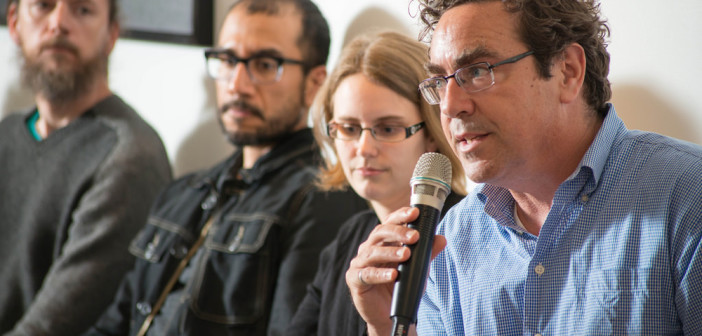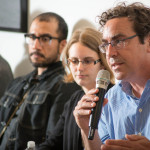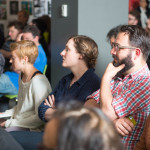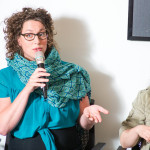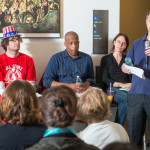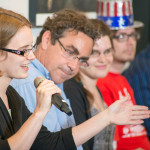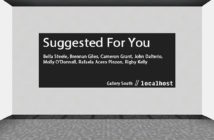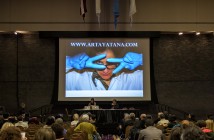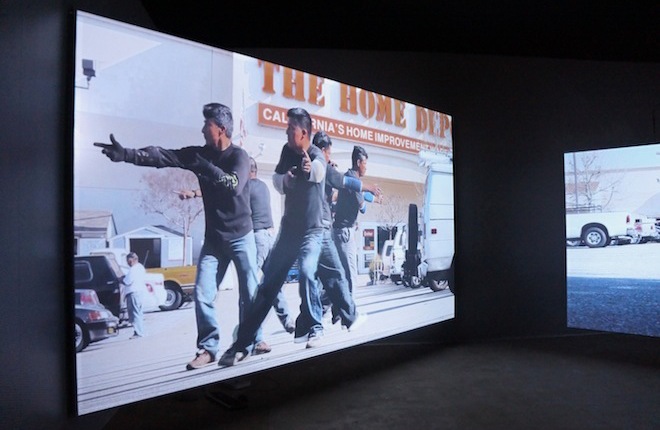Over 100 people gathered at Lesley University on Wednesday June 4 to talk about "How We Get By." Organized by Matt Kaliner, Tim Devin, and Jason Pramas, the event was billed as "a group exploration of how artists earn their money for living and creative expenses," and featured a panel of 10 local artists representing a diverse sampling of Boston’s creative community. Kaliner, a lecturer in arts and urban development at Harvard, kicked off the discussion by underscoring its firsthand and informal character, calling for "storytime and confessions." Those stories ran from anecdotes of scrimping and saving and practical tips about organizing one’s time to larger questions about how this region treats the artists who make their homes here.
The event’s subtitle could’ve been "What They Didn’t Teach You in Art School," one of the evening’s wry refrains. These extracurricular lessons all derive from the fact that only a small percentage of artists can support themselves off the sale of their work, a dilemma magnified by living in a city as punishingly expensive as Boston in the era of the Great Recession. Self-taught conceptual artist Heather Kapplow put a figure on it: last year she made $200 from her art, off something she’d spent three times that to make. The money, she added, hadn’t even come from Boston. The laughter that greeted that line had a knowing edge to it, reflecting the additional hurdle that the arts here are notoriously underfunded compared to other cities — not only New York or Chicago but Charlotte, Minneapolis, Columbus, and Louisville — as director of the Somerville Arts Council, Gregory Jenkins, affirmed. In this context, each of the evening’s participants spoke of the patchwork of strategies and compromises that went in to making their living, assembling the materials of survival so that they might somehow carry on making their work.
 How We Get By panel, June 4, 2014; seated left to right, Dirk Adams, Dave Ortega, Melinda Cross, Greg Jenkins. Photo credit: Ellien Laramee-Byers
How We Get By panel, June 4, 2014; seated left to right, Dirk Adams, Dave Ortega, Melinda Cross, Greg Jenkins. Photo credit: Ellien Laramee-Byers"My philosophy is to live simply in a Thoreau kind of way," said illustrator and artist Dave Ortega, a Somerville resident and transplant from El Paso, Texas. Like Ortega, many on the panel spoke of cutting corners and economizing, often simply doing without what other young professionals might take for granted, such as smartphones or cable TV. It might mean buying clothes at thrift shops, designing routes and departure times to avoid tolls and parking fees, or doing without a car altogether. For Tim Devin, also from Somerville, it meant developing a deliberately lo-fi, low cost art practice, one that did not require a studio and could be done even in one’s lunch hour. For photographer and artist Coelynn McIninch it meant skill-sharing instead of paying for work she couldn’t do herself, in her case trading photography for metal working. Heather Kapplow vividly summed up the artist’s stringent economizing in her quip that she’d stop for a nickel on her bike and a penny on foot.
 How We Get By panel, June 4, 2014; seated left to right, Melinda Cross, Greg Jenkins, Emily Garfield, Greg Cook, Shea Justice. Photo credit: Ellien Laramee-Byers
How We Get By panel, June 4, 2014; seated left to right, Melinda Cross, Greg Jenkins, Emily Garfield, Greg Cook, Shea Justice. Photo credit: Ellien Laramee-ByersKapplow will need those pennies for her rent, which besides being too high in this city is always — thanks to the ironies of the "creative economy" — about to get higher. The impending Green Line extension to Somerville’s Union Square, for example, prompted Dave Ortega to remark that he didn’t know where he would be living in 5 years. "The reason artists want to live in this city is the very thing that’s driving up costs," he lamented. In response, some on the panel recommended buying over renting, perhaps in one of the city’s relatively less pricey districts, like Dorchester or East Boston, or else moving outside of Boston altogether, to Malden or Fitchburg. Artists’ cooperative housing is another option, explained Cambridge resident and director of the Boston Paper Collective Melinda Cross; while not for everyone, she found it creatively stimulating as well as financially reasonable.
For the artist in Boston, every choice involves a trade off, perhaps nowhere more so than when it comes to employment. Every hour spent working for wages is an hour away from one’s art, often in pursuits that seem far afield from one’s first or even third choices. But Coelynn McIninch’s defiant proclamation — "Never apologize for what you have to do to make your art possible" — was well received by her assembled peers. McIninch cited the social skills she’d developed during waitressing gigs as evidence that even the least likely jobs were opportunities to learn things that could be turned to account in the art world, with the additional benefit that they often made for the best stories in one’s bio. A case in point might be painter and Jamaica Plain resident Shea Justice, now an art teacher, who used to rent tables at comic book conventions and draw the fans as superheroes, at least until the tables got too expensive and the requests too weird ("a threesome with Aquaman") in the comics boom of the 90s.
 How We Get By panel, June 4, 2014; seated left to right, Andi Sutton, Heather Kapplow. Photo credit: Ellien Laramee-Byers
How We Get By panel, June 4, 2014; seated left to right, Andi Sutton, Heather Kapplow. Photo credit: Ellien Laramee-ByersSome types of work sounded more convivial for artists than others, however, with a job at one of Boston’s many colleges and universities high on that list. Andi Sutton extolled "the beauty of being academically employed" and explained how she saw her position as manager of the Graduate Program in Women’s Studies at MIT not as a day job but a parallel career that enriched her performance and social practice art. Other participants highlighted their positions at nonprofit organizations, such map creator Emily Garfield, who works part time for Somerville Open Studios. But nonprofits have their downside as well, requiring high emotional and psychological commitment for relatively low pay. Heather Kapplow remarked that after such work it was refreshing to be "sucking corporate titty for the first time."
 How We Get By panel, June 4, 2014; seated left to right, Emily Garfield, Greg Cook, Shea Justice, Coelynn McIninch; standing left to right, Tim Devin, Jason Pramas. Photo credit: Ellien Laramee-Byers
How We Get By panel, June 4, 2014; seated left to right, Emily Garfield, Greg Cook, Shea Justice, Coelynn McIninch; standing left to right, Tim Devin, Jason Pramas. Photo credit: Ellien Laramee-ByersPrecariousness is the norm for many of these artists. Jason Pramas, from Cambridge, calculated that he’d been employed at a traditional full-time job for only 6 years of an adult life that was approaching 50. "This economy has been kicking my ass," declared Greg Cook, who used to write art reviews for the Boston Phoenix before the weekly closed its doors last year. Paid journalism was dying, and now Cook had to cobble together 3 or 4 jobs to make ends meet for himself and his family. That’s a familiar story to Somerville sound and performance artist Dirk Adams, who has tried to support himself as an art handler and installer. After 9 years of helping to mount shows at most of the region’s headline museums and exhibition spaces — from the DeCordova to the Institute of Contemporary Art — he still finds that he has to scramble for each new gig. With no control over his schedule, the work has a way of arriving when he’s busy with his own projects and drying up when he’s got time on his hands. With no benefits and nowhere to go with it, there’s no margin of error, either.
Even artists who had managed to establish relatively secure lives for themselves could chafe at the limits. Tim Devin asked if the modest life and lo-fi practice he had built for himself could accommodate a change if he wanted to branch out. Andi Sutton wondered if her newfound interest in more studio-based pursuits like sculpture and watercolors would make a good fit with her academic career and social practice art.
The audience that evening wasn’t just newbies who wanted to learn from those artists who’d been around the Boston block, but included many who’d been around the block themselves and wanted to swap stories and commiserate with their peers. During the discussion period they raised a number of issues in open exchange with the panelists, and various practical measures were proposed: We need a centralized clearinghouse of all the local events and shows, such as New York’s Artcards. But we also need to get out more and attend each other’s events. We need to press the city to adopt a more streamlined permitting process and the Massachusetts Cultural Council to expand its grant categories to include community-based and conceptual art; we need to write and call our elected representatives in support of art-related legislation and to be involved in the electoral process through initiatives such as Artists Under the Dome. Everybody seemed primed for action, with suggestions that could yield tangible results. The downside was perhaps too quick a recourse to a narrow pragmatism, as if all one could hope to achieve were marginal improvements to the already-existing state of affairs.
In this post-Occupy era, we have a unique opportunity to start thinking about changing the field of play even as we work to improve our lives in the here and now. More and more artists are starting to question the conditions of their labor in fundamental ways and organize to make changes. Working Artists and the Greater Economy (W.A.G.E.), for example, has been collecting data on the outrageous amount of unpaid work that is routinely expected of artists and developing a best practices model for artists to finally get paid. The activist group Occupy Museums has been reaching out to forge links between artists and other workers, mounting a successful campaign to compel the Frieze Art Fair to hire union labor and now, as part of Gulf Labor, creatively protesting the Guggenheim’s complicity with the hideous working conditions in the construction of its Abu Dhabi franchise.
It’s in this spirit, perhaps, that a follow-up to "How We Get By" has been scheduled for Wednesday June 25, 6:30-9:30pm, in the Sherrill Library of Lesley University’s Brattle campus. Building on the obvious enthusiasm exhibited at the last meeting, this one extends a hand to "visual artists, designers, musicians, dancers, actors, writers, filmmakers, videographers, audio specialists, architects, makers, and every conceivable hybrid of same" in order to see what sentiment exists for a broad network of creative workers. Maybe one day the discussion will be not just about how we get by, but about how we flourish.
How We Get By original website: http://www.howwegetby.org/
For more information on the upcoming meeting visit: http://www.facebook.com/events/1433263693601957/
- How We Get By panel, June 4, 2014; seated left to right, Dirk Adams, Dave Ortega, Melinda Cross, Greg Jenkins. Photo credit: Ellien Laramee-Byers
- How We Get By panel, June 4, 2014; audience. Photo credit: Ellien Laramee-Byers
- How We Get By panel, June 4, 2014; seated left to right, Andi Sutton, Heather Kapplow. Photo credit: Ellien Laramee-Byers
- How We Get By panel, June 4, 2014; seated left to right, Emily Garfield, Greg Cook, Shea Justice, Coelynn McIninch; standing left to right, Tim Devin, Jason Pramas. Photo credit: Ellien Laramee-Byers
- How We Get By panel, June 4, 2014; seated left to right, Melinda Cross, Greg Jenkins, Emily Garfield, Greg Cook, Shea Justice. Photo credit: Ellien Laramee-Byers

